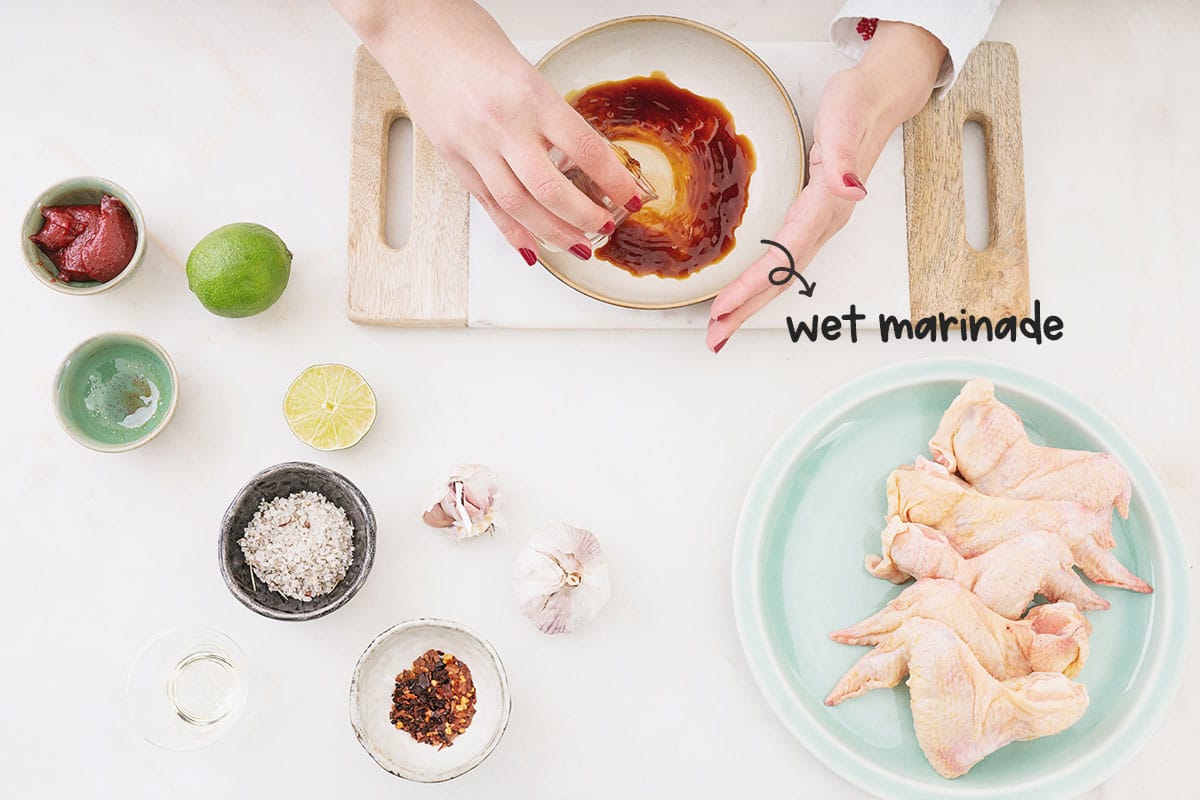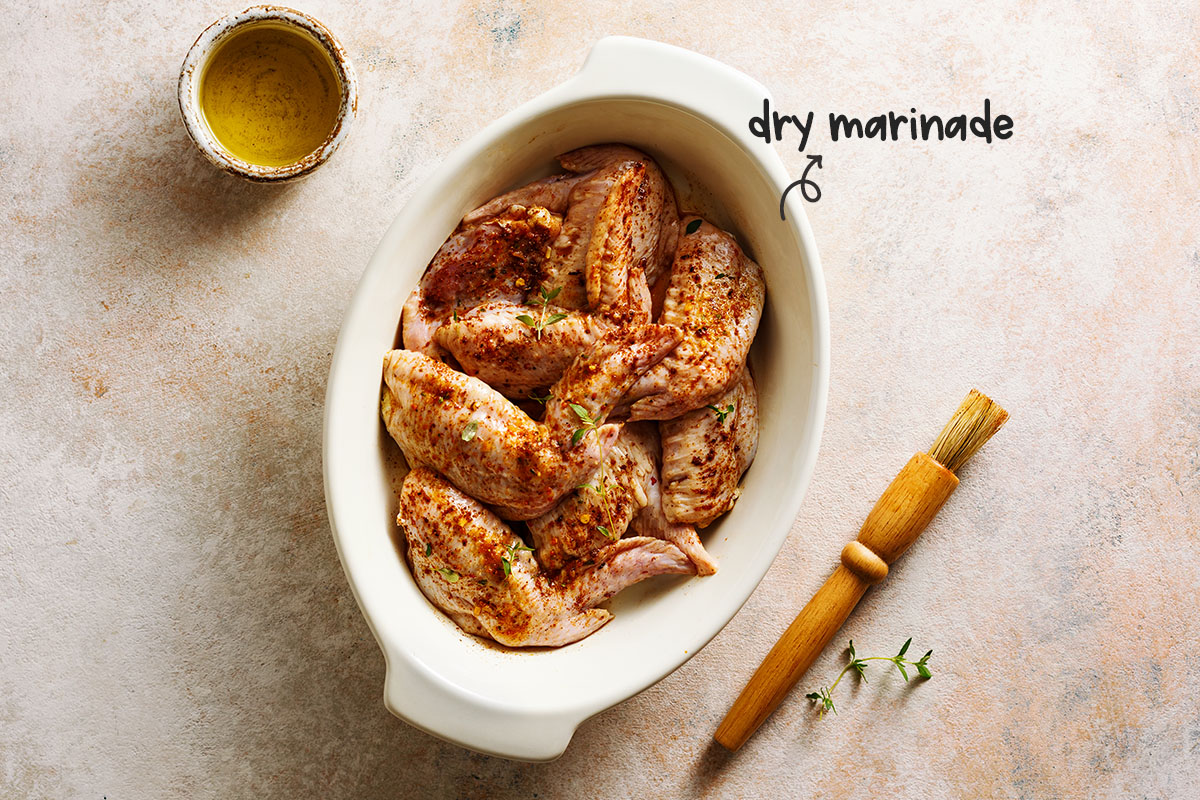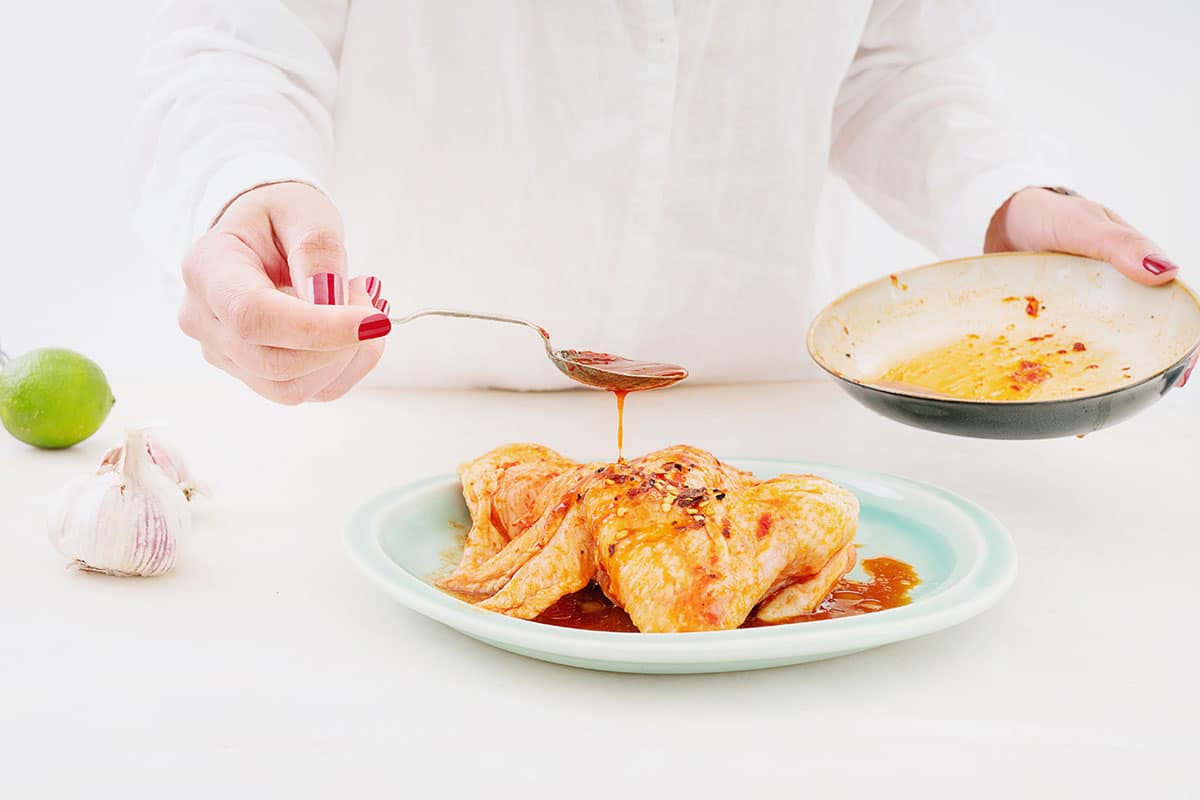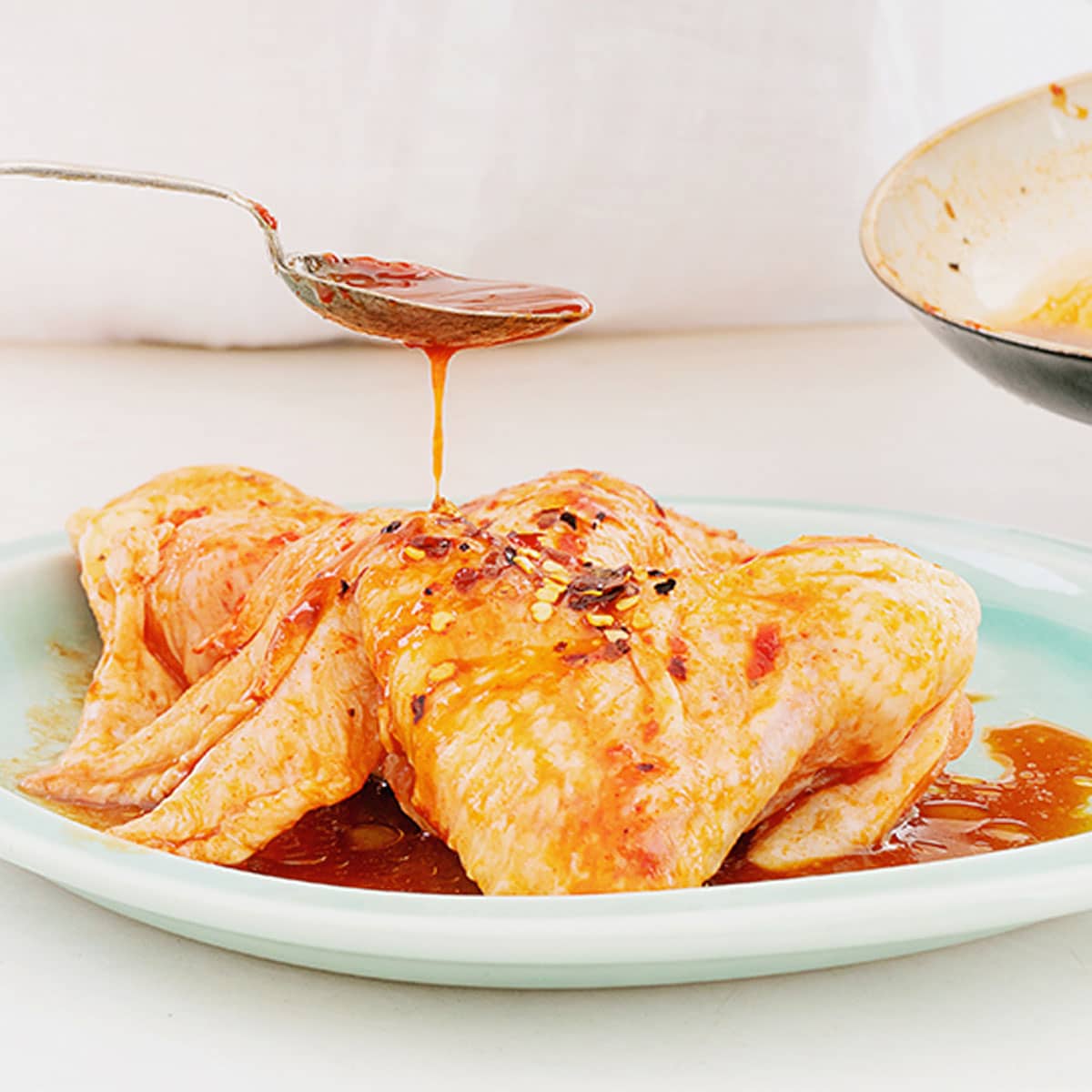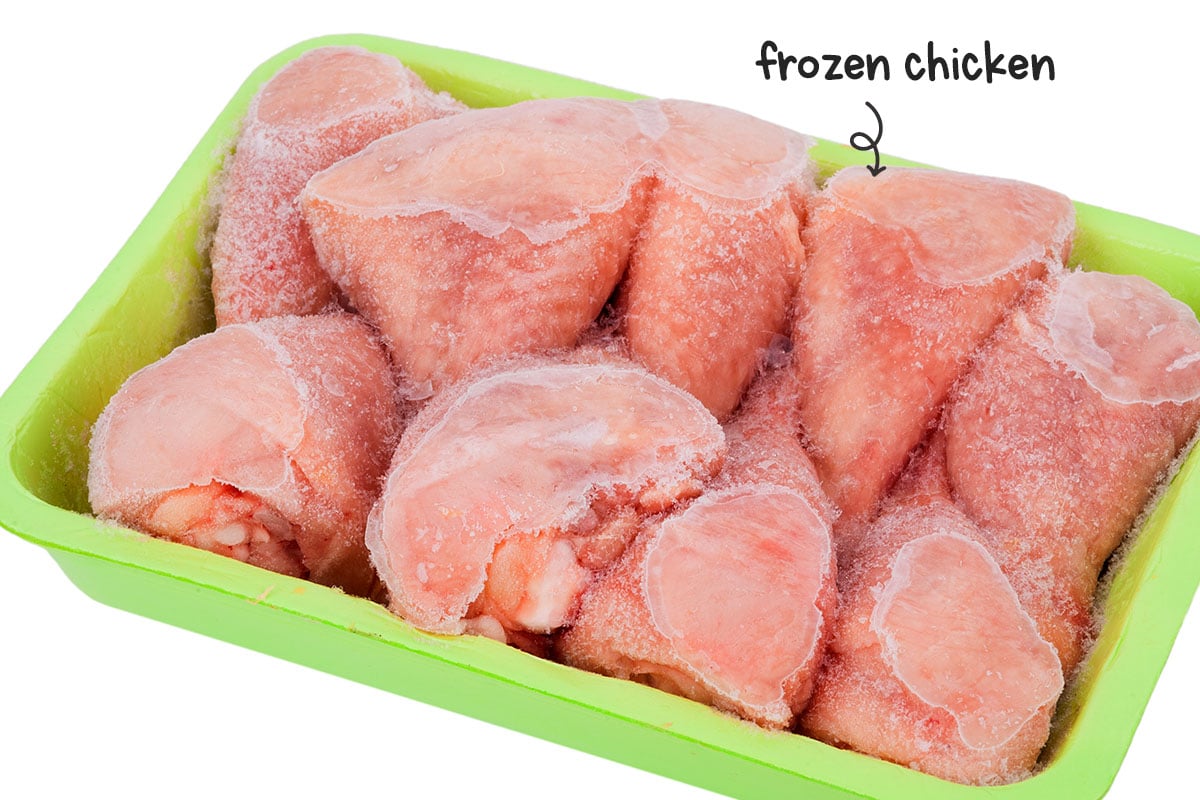It stands to reason that you can marinate chicken better when it's thawed than when it's still frozen. But what about if you don't have sufficient time to defrost it before marinating? Can you marinate frozen chicken, and if so, how?
Ideally, you should defrost frozen chicken overnight in your fridge, and if you do, you can also marinate it simultaneously.
Jump to:
Okay, the chicken won't marinate properly until it's thawed, but that doesn't mean you can't prepare everything simultaneously.
You know why?
If you pour the marinade all over the frozen chicken, some of it will wash off as the ice crystals melt, but it will still impart some flavor. It's better than nothing.
The origins of marinating
The word "marinade" derives from the Latin word "mare," which means the sea. The verb "marinate" was the first to appear in the English language in the early 17th century. The noun "marinade" appeared later in the 18th century.
Some people, however, do not believe that it had anything to do with seawater but that it was derived from the French word "mariner" or the Italian word "marinara," which means to pickle.
If you check the Oxford English dictionary, it explains that marinade refers to salt or briny water, which led to the brining of meats or the use of coarse salt to tenderize and flavor the flesh.
Marinating vs brining
The main difference between brining and marinating is that bringing doesn't use much in acid, whereas marinates do.
Today's marinades are mixtures of various acids, oils, herbs, spices, and other ingredients, which we will go into later.
Suffice it to say that when you enjoy the flavors and textures of things like a chicken tikka or chicken curry, it is because you marinated the meat in a particular blend of ingredients.
Can you marinate frozen chicken?
If you're someone who loves chicken, you will appreciate the joy of biting into a piece of chicken that is succulent, tasty, and tender all at the same time.
The best way of achieving this gorgeous combination is by using a marinade.
The two ways of marinating a chicken
You can marinate chicken in one of two ways - wet or dry. Let's look at each one in turn.
The wet marinade process
Wet marinating is when you take a piece of meat and coat it all over with a liquid marinade. If you don't want to immerse the meat in the marinade totally, you will need to turn it over so that all crevices are exposed to the marinade.
There are three basic types of wet marinades. They are:
- Enzyme marinades - As the name suggests, these types of marinades rely on enzymes within ingredients such as ginger, papaya, and pineapple. These enzymes work to break down the collagen and muscle fiber in the meat, thus tenderizing it. In the process, they also add delicious flavor.
- Acidic marinades - are made with natural acids such as citrus juice, lemon juice, tomato juice, and wine.
- Marinades from dairy products - are made with dairy products, including buttermilk, curds, and yogurt.
The dry marinate process.
Dry marinades are often created with barbecue type spices such as:
- Dried herbs
- Dried spices
- Various rubs such as Cajun, Jamaican, and Tex-Mex
The importance of marinating chicken
A really good effective marinade will work its way into the chicken flesh itself, thereby adding flavor to the meat.
They are also important because they:
- Reduce the amount of potentially harmful substances that can result when chicken is grilled.
- Help to stop the meat from becoming dry and chewy.
- Tenderize and make the chicken meat more succulent
- Act as a preservative
- Reduce the length of time for which the chicken has to be cooked. This also helps to ensure the meat doesn't dry out.
How long should you marinate the chicken?
If you are marinating a frozen chicken, you need to bear in mind that the delicious taste of the marinate isn't going to penetrate the chicken flesh until it has thawed.
It will still only penetrate approximately one-quarter of an inch into the flesh when it has done so.
- To get maximum flavor penetration, you need to leave the chicken for between 2 and 4 hours once it has fully thawed to allow the marinade to do its job.
The time it needs to work properly will depend on the type of marinade you're using.
Whatever you do, do not wash the marinade off the chicken before you start cooking it. Cooking the chicken with the marinate still on it helps with the penetration process.
Plus, if you wash the marinade off, the skin won't be as tasty as it should be.
When you cook chicken, it is important to ensure that the internal temperature reaches hundred and 165°F. A meat thermometer will help you to gauge this.
It is also important to learn how long can raw chicken sit out.
Can you over-marinade chicken?
You can over-marinate chicken if you use an acidic marinade containing either citrus juices, vinegar, or wine if you leave it on the chicken for too long before cooking.
It's because the marinade causes the proteins to loosen and then mesh together, making the chicken tougher.
When you marinate the chicken using an acidic marinade and leave it on for the right amount of time, it breaks down the meat tissue, allowing it to absorb the flavors and moisture of the marinade.
But as I just mentioned, leave it on there too long, and you'll end up with a tough bird.
Marinades containing enzymes:
The opposite happens if you leave an enzyme marinade, including something like pineapple or papaya juice, on the chicken for too long. It will cause the proteins to break down and result in the meat becoming mushy.
By marinating a frozen chicken, you expose it to the marinade for longer, which will also result in the meat becoming mushy. If you are going to marinate chicken, it's best to start with a fresh bird.
- As a rough guideline when marinating frozen chicken, marinades containing vinegar, wine, or salt shouldn't be left on chicken for more than 4 hours after it has thawed.
- In the case of citrusy marinates, two hours after thawing is sufficient.
If you notice that the chicken is starting to look a little grey or white during the marinating process, it means that it is "cooking."
It will result in the meat toughening, so start cooking it for real (baking, pan-frying, stewing, etc.) immediately. Don't wait any longer.
The right length of time to marinate chicken
When you marinate chicken, you can liken it to stretching when you exercise.
You do it to limber yourself up and be prepared for the exercise to follow; however, you will tighten up your muscles prematurely if you overdo it. The same goes for marinating chicken.
It's not just chicken. You can marinate any meat for too long, and if you do, the results will not be good. Take a quick look at this question and answer session on the USDA.gov website.
As a broad rule of thumb, I suggest that you should not marinate any meat for longer than a day. It might sound shorter than you originally thought.
But many recipes call for marinating overnight, which is effectively between about 8 and 12 hours. For chicken, in particular, recommendations go anywhere from six to 24 hours.
It's nothing to do with food safety; it's more to do with the meat quality. After marinating the two days, most meats will become quite mushy.
The steps to follow when marinating chicken
1 Whenever you marinate chicken or any other poultry or meat sort, it's best to use a glass dish or a plastic Ziploc bag.
2 Whatever you do, don't use a metal tray or dish because it might react badly with the acid in the marinade. Plastic bags are preferable because they capture all the marinade and any juices that might come from the chicken as it thaws.
3 You need around half a cup of marinade for every pound of chicken. Don't forget to rub it all over the chicken and turn it from time to time during marination.
4 Create the marinade using a combination of ingredients, including things like chili, coffee, herbs, lemon, oil, olive oil, orange juice, vinegar, wine, and yogurt.
5 The best marinades tend to be made with an acid component, with a fatty ingredient such as oil, plus various herbs, spices, and syrups to give you the sort of flavor for which you're looking.
6 If possible, it's best to use fresh herbs rather than dried ones. However, if that's not an option, use dry herbs but crush them well to maximize the flavor before rubbing onto the chicken.
7 When creating your marinade, use a one-to-one ratio of oil versus other ingredients.
8 Don't forget that the longer an acidic marinade is left on your chicken, the worse the texture will become, and the end result will be a dry chicken. I find between 5 and 6 hours is about perfect.
9 If you are leaving your marinating chicken outside at room temperature for longer than an hour, I recommend that you cover it using a tightfitting lid and place it in your fridge. As I mentioned above, don't use a metal dish or tray.
10 To ensure the marinade penetrates the chicken, it's a good idea to pierce the flesh several times with a fork. Don't overdo it, though, as you might tear the skin.
11 Coat the chicken liberally with the marinade. If there is any leftover, don't be tempted to serve it - throw it away. It may have come into contact with the uncooked chicken if you applied the marinade by dipping a brush, and it could make people ill.
12 If your marinade contains acid, it can be left on the chicken longer but for no more than 24 hours.
13 Make sure your chicken is properly cooked before you serve it. Uncooked chicken can make people ill. Check that the internal temperature reaches 165°F before serving.
14 It is not recommended to use any artificial colorings, flavorings, or preservatives.
15 By all means, add salt to your marinade. It helps to tenderize the chicken.
16 Before you add your marinade to the chicken, it's best to mix it in a blender to ensure all the ingredients are properly mixed.
17 If you are marinating beef and pork, you can allow them to marinate overnight in your fridge. If you are marinating fish, don't marinate it for longer than two hours as the acid in the marinade will begin to cook the fish.
18 Don't forget that raw fish, meat, and poultry contains bacteria that could cause illness. That's why it is best to place the marinated product into the fridge rather than leaving it out at room temperature.
19 You should throw any contaminated leftover marinade away.
20 Marinating fish, meat, and poultry is a great way of imparting extra flavor, and you can also use it to tenderize the tougher cuts of meat without adding too many extra calories or much fat.
Why use curd or yogurt in your marinate?
Yogurt is a wonderful product for tenderizing meat gently. Acidic and citric can easily toughen chicken and make it rubbery.
On the other hand, yogurt slowly tenderizes it, leaving you with the meat that you can pull apart with your fingers.
- This type of dairy marinade is even more effective when left on chicken for about 12 hours. It will work in shorter timeframes, but leaving it for 12 hours will result in really tender, succulent chicken meat.
- This type of marinade works so well because it forms a crust around the meat.
When cooked, this crust will still give you a nice crispy outer, but the flesh underneath will be gorgeously succulent. The crust acts as an insulating layer during the cooking process.
Which is the best type of yogurt to use?
When using a yogurt-based marinade on my chicken, I prefer to grill it. It produces a great flavor combination of caramelized yogurt with a hint of smoke.
However, cooking in a hot oven or pan searing also results in a great result. Take your pick.
As to what type of yogurt is best to use, it is recommended to use plain, unstrained yogurt. Avoid anything with vanilla or flavorings in it.
Greek yogurt
A lot of recipes call for Greek yogurt, which is beautifully creamy but contains less moisture. To loosen it up to spread it over the chicken more easily, add a little vinegar or lemon juice.
I did say to avoid using flavored yogurts, but by this, I meant store-bought flavored yogurt. Yogurt is pretty bland stuff, so adding a little ginger or lemongrass is just the ticket.
If like me, you are a fan of Middle Eastern cuisine, you can always add things like healing, garlic, ground chili, and fresh herbs.
These combinations work well not only with chicken but with other meats, too, including beef, lamb, and pork.
Soaking chicken in buttermilk
If you want to soak your chicken in buttermilk, you should do so for at least 8 hours. You can, however, leave it to soak for as long as 48 hours.
Once again, it's best to use a glass bowl and cover it with a tightfitting lid, then position it inside the fridge to marinate.
How cooking chicken in milk works
Milk contains calcium, and it is this that works as a natural enzyme with chicken helping it to tenderize. It's also great for neutralizing acidity or spicy heat.
The same goes for coconut milk as well. It creates a creamy sauce that makes the roast chicken even more succulent.
Chicken and milk is a tried and trusted combination. People have been making chicken pot-pie and chicken in the mushroom sauce for decades, and both recipes have milk in them.
Defrosting chicken before marinating
If you have forgotten to defrost your chicken, and you want to do so before marinating, there are some quick ways of going about it.
Some of the options I'm about to share with you work more quickly than others and will allow you to defrost your chicken, after which you can marinade it for the best results.
1 Defrosting frozen chicken in hot water
A way of accelerating the process of defrosting frozen chicken is to use hot water. It still takes time, but it's quicker than leaving it to defrosting your fridge overnight.
Here's how to do it:
- Get a large pan or bucket, or even put a plug in your sink. Use that as a container for defrosting, depending on the size of the bird.
- Fully immerse it in hot water, and let the chicken sit it to defrost. It's likely to take somewhere between 30 to 60 minutes, depending on the size of the chicken, but it's a lot faster than overnight defrosting in your fridge.
Useful tip:
If you decide to go down this hot water defrost route, it's best to leave your chicken packaged or wrap it in cling film beforehand.
It's also best to replenish the hot water several times during the defrosting process. So, as the water cools down, let some out, and top it up with fresh hot water.
It's also good to agitate the water from time to time to prevent cold pockets from forming. If you do this, you may quicken the defrost time closer to 30 minutes.
It might seem a little bit like a rigmarole, but trust me, it's far better than trying to marinate chicken while it's still frozen. You'll get a much better result when you cook the bird.
2 Defrosting chicken overnight in your fridge
If you've got sufficient time on your hands, this is a nice and easy way of defrosting a frozen chicken. It's tried and trusted.
When you position the bird in your fridge, it's best to place it in a warm part of the fridge. Warmer parts tend to be away from the fan or icebox and close to the door.
Just pop it in the fridge, well covered, and leave it overnight, and hey presto, it will be ready for marinating in the morning. Nice and easy. All it takes is a little forethought.
3 Using a microwave to defrost frozen chicken
The first thing to tell you is that I wouldn't advise you to try this method with a whole chicken. It would be best if you only used it for smaller cuts.
Start by selecting the defrost option on your microwave.
Remember, you're not trying to cook the bird, only to hasten the defrosting process. It's the sort of thing that for which microwaves were designed.
- Remove any packaging from the chicken and place it on a microwave-safe dish.
- Microwave in bursts of 2 minutes
- After each burst, check the chicken and reposition it to ensure that all areas of the frozen chicken are evenly defrosted.
Please note:
As the chicken defrosts, it is likely to change color slightly around the edges. Don't worry. If you've selected defrost on your microwave, it's not cooking.
It is only a reaction to the frozen meat being defrosted quickly.
Once you are certain that the chicken is defrosted nicely and evenly, you can begin to marinate it if you so wish.


